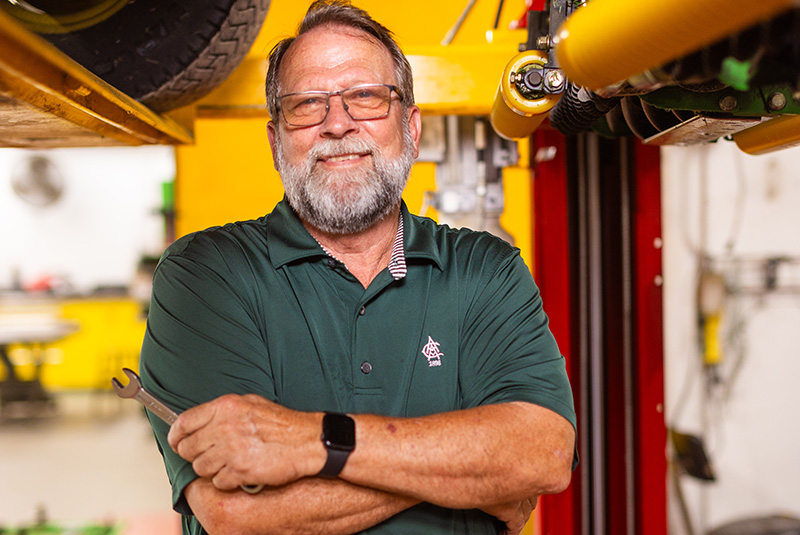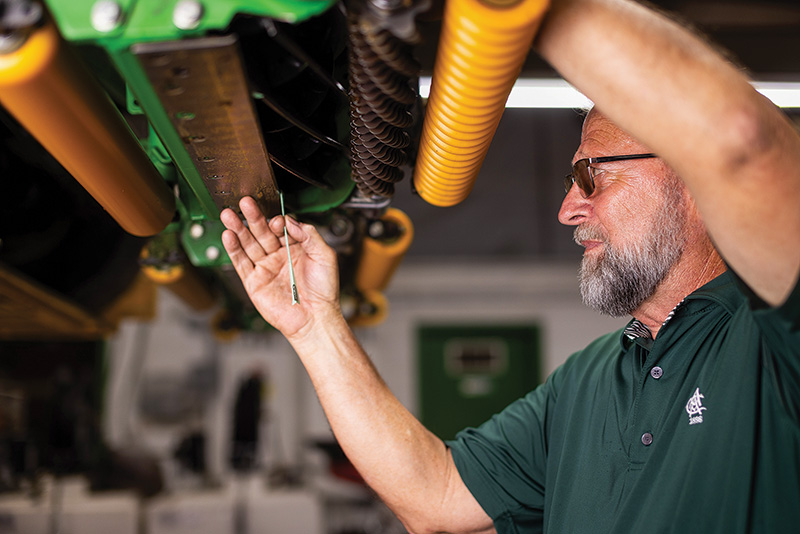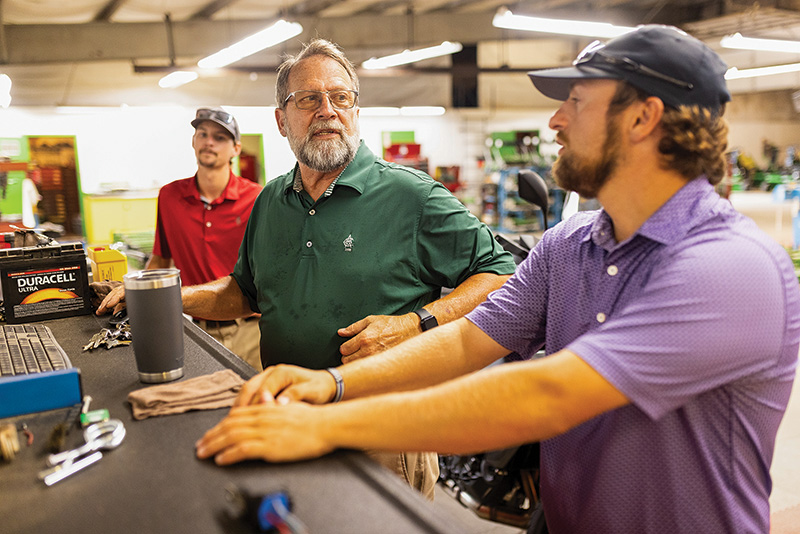
Edwin Budding Award winner John Patterson, CTEM, in his happy place — the Atlantic Athletic Club maintenance building. Photos by Justin Wojtczak
John Patterson, CTEM, can think of a couple of reasons that might have prevented him from lasting very long in — let alone making a lasting impression on — the golf course maintenance industry.
“I can’t stand golf,” he says with a chuckle. “And I’m colorblind in a green industry.”
And yet here we are, three decades in, and Patterson — whose red/green colorblindness has him seeing the world mostly in shades of gray, blue and yellow — finds himself at the pinnacle. In the world of golf course equipment management, he’s an established subject-matter expert, a world-traveled presenter and speaker, inventor and innovator.
Patterson, equipment director at the Atlanta Athletic Club in Johns Creek, Ga., and 11-year GCSAA member, helped form, and later served as president of, the International Golf Course Equipment Managers Association, and helped spearhead that group’s drive to professionalize that profession. Then he was instrumental in seeing those men and women successfully transfer over to GCSAA and had a hand in the Certified Turf Equipment Manager designation that, in time, he quickly earned for himself.
So, yeah, it’s pretty fair to say Patterson — friends call him J.P. — found a way to find his way through the industry.
“Why did I stay? I just love long hours and low pay,” he says. “No, I stayed, No. 1, for the variety. I have this mind that I have to fix everything. I’m a fixer. I was born that way. I’m sorry. If I grab a grocery cart with a wobbly wheel, I want to fix that wheel. I get that little dopamine rush when I fix things. I liked packaging machinery and printing presses. But there’s so much in this industry for a fixer to get his … fix.”
And now Patterson has even more validation that he belongs in the EM pantheon. He has been named the winner of the 2025 Edwin Budding Award, a lifetime achievement award given annually to “an individual in the turf equipment industry whose actions have helped shape the turf equipment industry.”
“It really is something,” Patterson says of the award named for the English inventor of the reel mower that originally was managed by the IGCEMA. “It’s something I saw the genesis of. I’m really honored and humbled. There are some really great folks who have won this award, and I think I learned something from every one of them. It’s gratifying and validating at the same time.”
‘I grew up in the garage’
Patterson calls himself a lifelong mechanic.
The son of a “frustrated engineer-type” father, Patterson rebuilt his first engine — a little Briggs & Stratton — when he was 8.
“I grew up in the garage,” he says of his early years in Normal, Ill. “I didn’t play a lot of stick-and-ball sports.”
Father and son would wrench on cars in their spare time and race them on weekends.
Patterson dropped out of high school (he later returned to get his GED) to go into automotive mechanics before transitioning to industrial mechanics, working on printing presses in the Chicago area. Ultimately, the Windy City’s notoriously harsh winters drove him south. Or, more accurately, cycled him south.
“Amazingly fit” at the time, Patterson rode his bike from New Orleans to Fort Myers, Fla. — “The move from Chicago to Florida is a story in and of itself,” he says — in the spring of 1993. Single and 30 years old, he planned to become a marine mechanic, so the carless Patterson pedaled his way from Fort Myers to Bonita Springs to Naples, looking for work at every marina he’d encounter.
“Every single marina mechanic I talked to said, ‘Find something else to do. It’s terrible,’” Patterson recalls. “They said, ‘It’s not what you think it is. You’re not working on rich peoples’ yachts. You’re mucking around in bilges in Florida in the summer. It’s no fun.’”
So young Patterson faced a crossroads. From his rented apartment in Fort Myers, he pondered.
“I knew I didn’t want to go back to Chicago,” he says. “I was fed up with the cold. All my memories were of just bitter, cold winters. I picked up a News-Press newspaper and saw an ad for an assistant mechanic at The Forest Country Club. So I hopped on my bicycle, rode down to the course and got a job.”
In retrospect, two aspects of that first foray into the industry seem remarkable.
First was the relatively lax set of requirements.
“I had a pulse,” Patterson says. “And I knew righty tighty, lefty loosey. I was hired.”
That relatively random trip into The Forest CC maintenance building had another serendipitous outcome. Behind the desk sat Kim, the administrative assistant to the superintendent who handed over the application for Patterson to fill out. “She’s my wife now,” Patterson says. “She’s an awesome woman. We didn’t start dating right away, but five years after that, we ended up getting married.”

The first time he wallked into a golf course maintenance shop was the first time Patterson encountered a reel mower. Now he’s recognized as a grinding guru.
A grinding guru
Those early days in the shop were a challenge.
Though Patterson was born with a wrench in his hand, the specifics of maintaining a golf course equipment fleet were fleeting.
“I remember thinking to myself, ‘This ought to be a piece of cake. I’m just taking care of mowers.’ I’d never even seen a reel mower before,” says Patterson, who, ironically, has become something of a go-to guru when it comes to reel mowers in general and grinding in particular. “A couple of guys took me under their wings.”
One day, the EM — who, it turns out, was independently wealthy and, Patterson says, was only wrenching to keep busy — abruptly quit.
“There was another assistant at The Forest. He said, ‘I don’t want the job. You take it,’” Patterson says. “That was my first equipment manager position. From there, I started working my way up.”
Aside from a short stint as a field service technician for Kilpatrick Turf, Patterson bounced around clubs on the west coast of Florida before landing at the exclusive Calusa Pines Golf Club in Naples, working for Eric Von Hofen, Calusa Pines’ director of agronomy who now is a 35-year Life Member of the association. Another lucky happenstance — perhaps only slightly less life-changing than bumping into his eventual wife, Kim, at her old desk job — was working with Lukus Harvey, who at the time was an assistant superintendent at Calusa Pines GC.
That was Patterson’s first time working with Harvey, a 24-year GCSAA member who now is director of agronomy at Atlanta Athletic Club. It’s the fifth time those two have teamed up, and it’s not a coincidence.
“We’ve been attached at the hip for a long time,” Harvey says. “At the end of the day, I’m a proponent of that position in this profession. We can’t do our jobs without them. There are many great guys on the equipment manager side, some really awesome dudes, and everyone would agree John is one of the best. We hit it off from Day One.”
First Von Hofen then Harvey left Calusa Pines for Trump National Doral Miami (formerly Doral Golf Resort & Spa) and kept in touch with Patterson.
“I kept getting calls from Eric every six months: ‘Would you run my shop.’ I resisted,” Patterson says. “But it was too good of a deal.”
Patterson relented, and Doral was his first exposure to a big golf course — 90 holes — and PGA Tour-caliber conditions (the Doral Open/Ford Championship at Doral was played there from 1962-2006).
Harvey was transferred from there to what is now Trump National Jupiter, and guess who was among his first hires?
“It was a really cush gig. I walked into a brand-new fleet, all leased,” Patterson says.
That was only part of it. To justify hiring Patterson away from a 90-hole behemoth to an 18-hole facility under the same management company, Harvey arranged for Patterson to be an employee of both the Jupiter facility and the Abaco Club in the Bahamas.
“I was flying to the Bahamas once a month to consult and train and write a report,” Patterson says. “That was a super gig. And it wasn’t like they put me up in a hotel. I was staying in the members’ villas, eating off the members’ menu.”
Then Harvey dropped a bomb.
“He said, ‘I’m leaving.’ I said, ‘You jerk. We just got here,’” Patterson says.
Harvey went to PGA National and, eventually, hired Patterson on there, too, where he spent six years dealing with all the “moving parts” that go into a 90-hole facility that holds an annual PGA Tour event.
Patterson thought he was in for the long haul at PGA National until, 10 years ago, Harvey hinted another change was coming. “He came to me and said, ‘John, this is the final move. We have to go,’” Patterson said. “I said, ‘What do you mean?’ He said, ‘I think I have a good shot at getting Atlanta Athletic Club.’ I’d only ever heard the name Atlanta Athletic Club in passing. When I started looking at what the Atlanta Athletic Club is all about, I realized, ‘Holy cow, this is a heck of a move.’”
This dynamic duo’s reunion, Patterson insists, is a last hurrah.
“I plan to retire from this place,” says Patterson, who, with wife Kim raised 19-year-old son Evan. “I’m on the glide slope. We’re going to hold the 2030 U.S. Amateur. We have a whole lot of work going on between now and then. But when that last putt drops in 2030, I told Lukus, ‘I’m done.’”
“Huge shoes to fill,” Harvey says. “I think about it probably an unhealthy amount.”

Patterson (center) with equipment technician intern Brayden Castellani, left, and Matthew Borrelli, assistant superintendent at AAC’s Highlands Course.
A consummate pro
One does not win an award like the Budding Award just for having great stories to tell about great facilities. Stephen Tucker — winner of the Budding Award in 2015, when it first came under GCSAA’s purview, and founding father of the IGCEMA — attests that Patterson’s contributions to the equipment manager profession go well beyond his résumé.
“It’s been a long time coming for him to win this award,” says Tucker, director of golf course and landscape operations at Four Seasons Golf and Sports Club Orlando and 24-year GCSAA member. “You won’t meet a more genuine guy who’s more willing to share his secrets. He was a big part of starting IGCEMA. He was one of a handful of people I invited to talk about what our vision would be. He’s been instrumental in a number of technicians becoming equipment managers after he mentored him. He’s taught a number of seminars. I’d say the biggest thing is his professionalism. There’s no doubt he knows everything there is to know about turf equipment, and if he doesn’t know it, he generally figures it out.”
Amen, says Harvey, who said he had just emerged from a grounds committee meeting, half of which he entrusted to Patterson. AAC was about to roll out a new fleet of robotic mowers, and Harvey asked Patterson to explain it.
“They were all oohing and aahing,” Harvey says. “There’s a total sense of ownership with him. There’s no lines of demarcation. He’s all-in on everything. Every time he speaks to the members, they’re like, ‘Oh my gosh. We should have every new member go through orientation with John Patterson.’ We have $6 million in assets down there, and there’s no one in the world we trust more with that than John Patterson.”
Andrew Hartsock (ahartsock@gcsaa.org) is GCM’s editor-in-chief